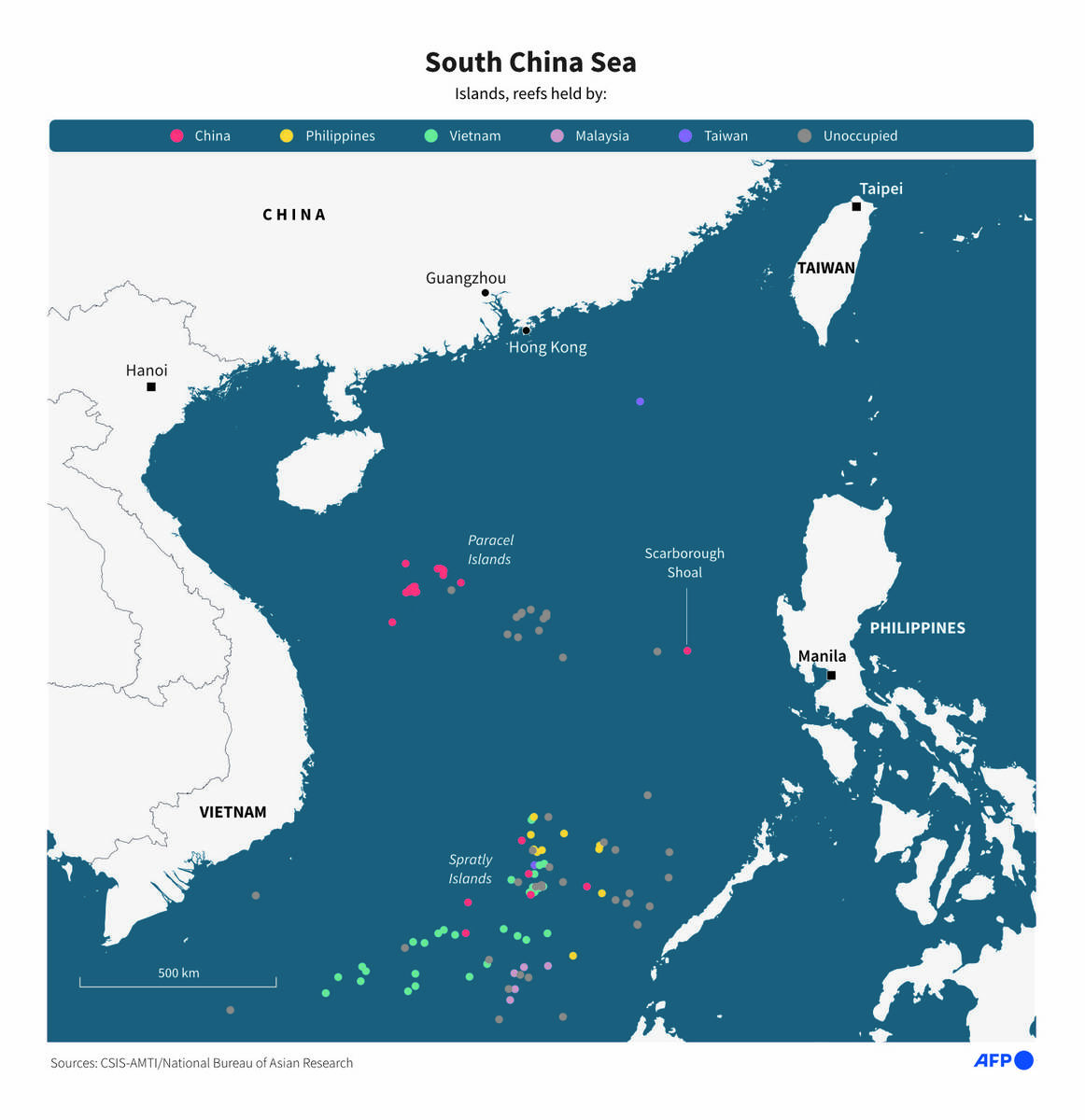MANILA: The US military is open to consultations about escorting Philippine ships in the disputed South China Sea, the head of US Indo-Pacific Command said Tuesday amid a spike in hostilities between Beijing and Manila in the disputed waters.
Adm. Samuel Paparo’s remarks, which he made in response to a question during a news conference in Manila with Philippine Armed Forces chief Gen. Romeo Brawner Jr., provided a glimpse of the mindset of one of the highest American military commanders outside the US mainland on a prospective operation that would risk putting US Navy ships in direct collisions with those of China.
Chinese coast guard, navy and suspected militia ships regularly clash with Philippine vessels during attempts to resupply Filipino sailors stationed in parts of the South China Sea claimed by both countries. As these clashes grow increasingly hostile, resulting in injuries to Filipino sailors and damage to their ships, the Philippine government has faced questions about invoking a treaty alliance with Washington.
Paparo and Brawner spoke to reporters after an international military conference in Manila organized by the US Indo-Pacific Command, at which China’s increasingly assertive actions in the South China Sea were spotlighted. Military and defense officials and diplomats from the US and allied countries attended but there were no Chinese representatives.
Asked if the US military would consider escorting Philippine ships delivering food and other supplies to Filipino forces in the South China Sea, Paparo replied, “Certainly, within the context of consultations.”
“Every option between the two sovereign nations in terms of our mutual defense, escort of one vessel to the other, is an entirely reasonable option within our Mutual Defense Treaty, among this close alliance between the two of us,” Paparo said without elaborating.
Brawner responded cautiously to the suggestion, which could run afoul of Philippine laws including a constitutional ban on foreign forces directly joining local combat operations.
“The attitude of the Armed Forces of the Philippines, as dictated by the Philippine laws, is for us to first rely on ourselves,” Brawner said. “We are going to try all options, all avenues that are available to us in order for us to achieve the mission…in this case, the resupply and rotation of our troops.”
“We will then seek for other options when we are already constrained from doing it ourselves,” Brawner said.
President Ferdinand Marcos Jr. has said there has been no situation so far that would warrant activating the treaty, which requires the allies to come to each other’s aid if they come under external attack.
President Joe Biden and his administration have repeatedly renewed their “ironclad” commitment to help defend the Philippines under the 1951 treaty if Filipino forces, ships and aircraft come under an armed attack, including in the South China Sea.
Philippine Defense Secretary Gilberto Teodoro Jr said at the conference that China is “the biggest disruptor” of peace in Southeast Asia and called for stronger international censure over its aggression in the South China Sea, a day after China blocked Philippine vessels from delivering food to a coast guard ship at the disputed Sabina Shoal in the contested waters.
Chinese foreign ministry spokesperson Lin Jian said that “the label of undermining peace can never be pinned on China,” blaming unspecified other actors for “making infringements and provocations in the South China Sea and introducing external forces to undermine the large picture of regional peace and stability.”
Teodoro later told reporters on the sidelines of the conference that international statements of concern against China’s increasingly assertive actions in the disputed waters and elsewhere were “not enough.”
“The antidote is a stronger collective multilateral action against China,” Teodoro said, adding that a UN Security Council resolution would be a strong step, but unlikely given China’s security council veto.
He also called for the Association of Southeast Asian Nations to do more. The 10-nation Southeast Asian bloc includes the Philippines, Vietnam, Malaysia and Brunei, which have South China Sea claims that overlap with each other, as well as China’s and Taiwan’s.
“ASEAN, to remain relevant and credible, cannot continue to ignore what China is doing in the South China Sea,” Teodoro said.
In the latest incident in the South China Sea, Philippine officials said China deployed “an excessive force” of 40 ships that blocked two Philippine vessels from delivering food and other supplies to Manila’s largest coast guard ship in Sabina Shoal on Monday.
China and the Philippines blamed each other for the confrontation in Sabina, an uninhabited atoll claimed by both countries that has become the latest flashpoint in the Spratlys, the most hotly disputed region of the South China Sea.
China and the Philippines have separately deployed coast guard ships to Sabina in recent months on suspicion the other may act to take control of and build structures in the fishing atoll.
The Philippine coast guard said Chinese coast guard and navy ships, along with 31 suspected militia vessels, obstructed the delivery, which included an ice cream treat for the personnel aboard the BRP Teresa Magbanua as the Philippines marked National Heroes’ Day on Monday.
In Beijing, China’s coast guard said that it took control measures against two Philippine coast guard ships that “intruded” into waters near the Sabina Shoal. It said in a statement that the Philippine ships escalated the situation by repeatedly approaching a Chinese coast guard ship.
China has rapidly expanded its military and has become increasingly assertive in pursuing its territorial claims in the South China Sea, which Beijing claims virtually in its entirety. The tensions have led to more frequent confrontations, primarily with the Philippines, though the longtime territorial disputes also involve other claimants, including Vietnam, Taiwan, Malaysia and Brunei.
Japan’s government separately protested to Beijing on Tuesday, saying that a Chinese reconnaissance plane violated its airspace and forced it to scramble fighter jets.
US military open to escorting Philippine ships in the South China Sea, senior admiral says
https://arab.news/g6g5v
US military open to escorting Philippine ships in the South China Sea, senior admiral says



























